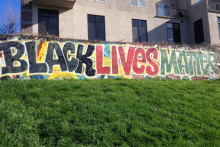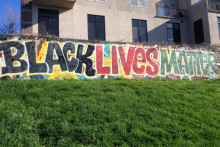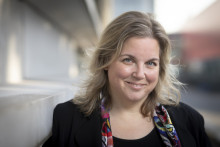‘We acknowledge the anger and sadness in our world, city, and university’, VU Amsterdam writes on its website. The university is now fostering debates, examining its own role in colonial history, looking at hidden inequality within its organisation and critically re-evaluating its curricula.
All this is part of VU Amsterdam’s response to the murder of George Floyd by a police officer in the United States. His murder also touched off a spate of demonstrations in the Netherlands.
Power
Other universities are also speaking out. Utrecht University plans to organise discussions and is asking students and staff to share their experiences. ‘We believe in the power of diversity and inclusion. Racism and discrimination are diametrically opposed to this.’
Erasmus University Rotterdam posted eight Black Lives Matter Film Tips and issued a statement on its website: ‘Erasmian values are anti-racist values’, it begins. ‘EUR stands fundamentally behind the creation of knowledge across all barriers of race, language, culture and background.’
Yet the Rotterdam institution has also received criticism from its own students, who question if and how the university intends to act on these sentiments.
At Maastricht, the executive board writes: ‘We oppose all forms of racism, from inequality of opportunity to ‘Zwarte Piet’.’ And it calls on everyone who wants to support the university’s cause to report to its Advisory Council Diversity & Inclusivity.
Stating the obvious
There are also universities that are staying all but silent, on the premise that it would simply be stating the obvious: of course they reject racism. In Wageningen students and staff launched a petition to compel a response from the university’s board, to which it yielded. Executive board president Louise Fresco tweeted ‘It is great to see the passion and concern of many staff, students & partners’, and promised she would be organising dialogues.
At the University of Tilburg, Professor Kutlay Yagmur (Language, Identity and Education) posted an op-ed on the site discussing the problem of racism. He praises the university: ‘I myself believe that the University of Tilburg as an organisation has always fought against racism and discrimination’, he writes. ‘Both in the workplace and in teaching, our identity is rooted in equal rights and equal treatment.’
Disadvantage
Among universities of applied sciences, the executive board president of Rotterdam UAS also spoke out against racism, drawing an analogy to the coronavirus crisis with a call to ‘flatten the curve’.
Background plays a sizeable role in higher education, figures show. Young people from non-Western, immigrant backgrounds are at a disadvantage. Selective admission, it turns out, is not a neutral tool.







